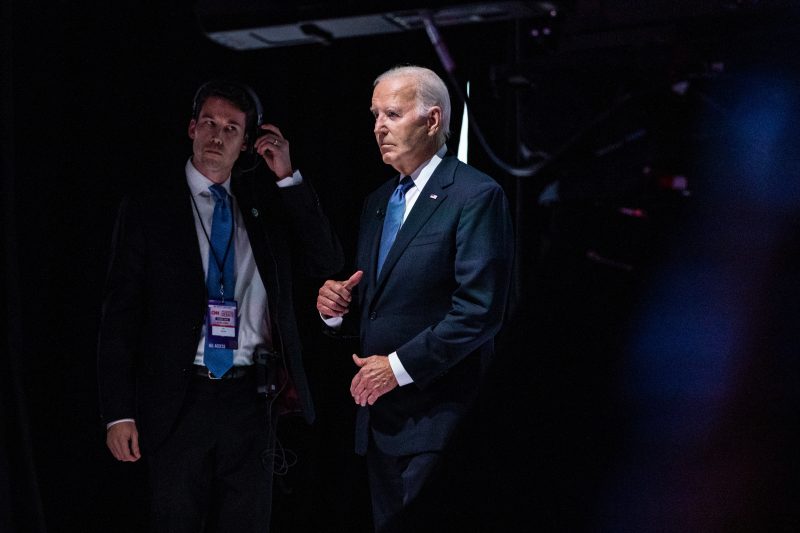Obviously, President Biden did not do a good job pressing his case against Donald Trump in the first presidential debate last week. That said, there was one argument that was surprisingly absent: that a second Trump presidency would put American democracy itself at risk.
The subject did come up, once the moderators from CNN broached it. Given his past comments, Jake Tapper asked, was Biden saying that Trump voters “will be voting against American democracy?”
“The more they know about what he’s done, yes,” Biden replied. He then offered examples, but, in keeping with the challenges that plagued his entire debate performance, they were jumbled and unclear, centered heavily on the events in Charlottesville in 2017. During his closing comments, Biden didn’t mention any threat to democracy at all, focusing instead on inflation.
Perhaps this was an oversight and perhaps it was intentional. Maybe the focus was on expanding Biden’s appeal to voters who weren’t convinced by his arguments about what a second Trump term might mean. But if the idea is that Trump poses a unique and immediate threat to the country, that certainly didn’t come through in Biden’s comments.
It’s clear that this is a central reason Biden has the support he does. In CNN’s poll released on Tuesday, voters who say they’re backing Biden in November chose “protecting democracy” as the most important issue in the election by a more than 2-to-1 margin over the second most commonly identified issue, the economy. And more than half of those who say they plan to vote for Biden say that they plan to do so more because they oppose Trump than because they like the incumbent president.
Then it got worse. On Tuesday, Rep. Jared Golden (D-Maine) wrote an essay effectively shrugging at the idea that Trump posed a threat to the country.
“Biden’s poor performance in the debate was not a surprise,” Golden wrote. “It also didn’t rattle me as it has others, because the outcome of this election has been clear to me for months: While I don’t plan to vote for him, Donald Trump is going to win. And I’m OK with that.”
After all, he added later, “[p]earl-clutching about a Trump victory ignores the strength of our democracy,” manifested in the response to the Capitol riot and in the millions of Americans who support the idea. The election, Golden said, “is about the economy, not democracy.”
Rep. Marie Gluesenkamp Perez (D-Wash.) agreed with Golden’s assessment of the likely outcome in a television interview: “The truth, I think, is that Biden is going to lose to Trump.”
They aren’t alone in that belief. A poll conducted by Siena College for the New York Times last month found that nearly a fifth of Biden supporters think that Trump will win the election. (About 1 in 8 Trump supporters think Biden will.)
And Golden and Gluesenkamp Perez have a motivation to treat a Trump victory as likely or even unremarkable: Each represents a district that Trump won in 2020. Separating themselves from an unpopular president in a moment of crisis or centering the choice this November on their own races is understandable in that context. There was a reason that Golden’s essay pivoted from questions about the presidency to the need for strong legislators in Congress, and it isn’t that he’s seeking reelection to the White House.
Again, though, Golden’s message in particular runs counter to the one that his party has been hammering. If democracy will be fine after a second Trump victory, even if its survival necessitates the mobilization of those millions of defenders, then all this stuff about the stakes in November are overwrought. All those people coming out to vote for Biden maybe can just stay home if they want — save voters in Maine’s 2nd Congressional District, of course, who should come out to vote for Golden.
The truth is that we don’t know what will happen should Trump win in November. We know that he and his allies have plans to overhaul government and centralize power in the White House in an exceptional way, plans boosted by the Supreme Court’s recent decision on immunity. But no one can say with certitude that democracy will be significantly damaged. In retrospect, such concerns may look like “pearl-clutching.”
The Democratic argument, though, has been that even a moderate avoidable risk is worth avoiding. They — and Biden in particular — have effectively prosecuted the case that Trump poses such a risk. That Biden mostly ignored it and that members of his party treat a Trump victory as imminent risks undermining that effort.
And, by extension, increasing the odds of a Trump win and making that risk less avoidable.








